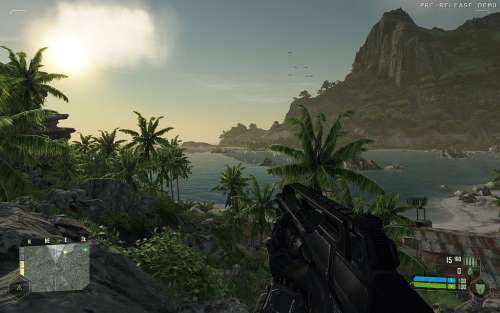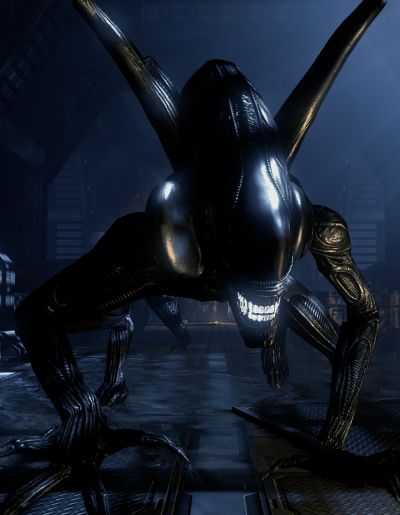ASUS Radeon HD 6950 Review Index
- 1 – Meet with ASUS’s Radeon HD 6950
- 2 – ASUS Radeon HD 6950 Features
- 3 – ASUS Radeon HD 6950 OpenGL performances
- 4 – ASUS Radeon HD 6950 Direct3D performances
- 5 – ASUS Radeon HD 6950 Gaming performances
- 6 – ASUS Radeon HD 6950 DirectCompute performances
- 7 – ASUS Radeon HD 6950 Power consumption and overclocking
5 – ASUS Radeon HD 6950 Game Performances
This review adds a new part: gaming performance. Synthetic benchmark are cool (from a developer point of view) but many readers are not developers and then wish to see benchmarks based on real video games. I mainly used benchmarks included in game demos and then, dear readers, if you know other game demos that include a benchmark, just let me know.
5.1 Crysis (DirectX 10)
I used the integrated GPU benchmark (64-bit) option provided with Crysis demo.

Settings: default.
Results: Average FPS for the TimeDemo Run 0.
| 77.87 FPS – ASUS HD 6950 |
| 74.46 FPS – Sapphire HD 6970 |
| 73.60 FPS – Sapphire HD 6870 |
| 73.55 FPS – Radeon HD 5870 |
| 69.37 FPS – EVGA GeForce GTX 580 SC |
| 69.34 FPS – GeForce GTX 480 |
| 65.20 FPS – MSI N460GTX Cyclone |
5.2 DiRT 2 (DirectX 11)
I used the benchmarking option provided with DiRT2 demo.

Settings: 1920×1080, 4X MSAA.
| 151.4 FPS – EVGA GeForce GTX 580 SC |
| 121.6 FPS – GeForce GTX 480 |
| 94.26 FPS – Sapphire HD 6970 |
| 88.74 FPS – MSI N460GTX Cyclone |
| 88.14 FPS – Radeon HD 5870 |
| 85.54 FPS – Sapphire HD 6870 |
| 85.09 FPS – ASUS HD 6950 |
5.3 Resident Evil 5 (DirectX 10)
I used the benchmarking option (DX10 version) provided with Resident Evil 5 demo.

Settings: 1920×1080. 4XMSAA
| 118.0 FPS – EVGA GeForce GTX 580 SC |
| 116.6 FPS – GeForce GTX 480 |
| 115.6 FPS – Sapphire HD 6970 |
| 107.8 FPS – ASUS HD 6950 |
| 104.5 FPS – Radeon HD 5870 |
| 99.9 FPS – Sapphire HD 6870 |
| 86.4 FPS – MSI N460GTX Cyclone |
5.4 Aliens vs Predator (AvP) Benchmark (DirectX 11)
Aliens vs Predator or AvP is a Direct3D 11 benchmark with a touch of tessellation. See here for more details:
AvP DX11 Tessellation Battle: GTX 480 vs GTX 470 vs HD 5870 vs HD 5770.

Settings: Resolution: 1920 x 1080, Texture Quality: 2, Shadow Quality: 3, Anisotropic Filtering: 16, SSAO: ON, Vertical Sync: OFF
DX11 Tessellation: ON, DX11 Advanced Shadows: ON, DX11 MSAA Samples: 1.
| 71.6 FPS – EVGA GeForce GTX 580 SC |
| 64.3 FPS – Sapphire HD 6970 |
| 58.3 FPS – GeForce GTX 480 |
| 58.2 FPS – Radeon HD 5870 |
| 56.8 FPS – ASUS HD 6950 |
| 47.4 FPS – Sapphire HD 6870 |
| 37 FPS – MSI N460GTX Cyclone |
5.5 Lost Planet 2 (DirectX 11)
Lost Planet 2 has been used for the test.

Settings: 1920×1080 fullscreen, test A.
| 79.9 FPS – ASUS ENGTX580 |
| 75.7 FPS – EVGA GeForce GTX 580 SC |
| 60.2 FPS – EVGA GeForce GTX 480 |
| 48.8 FPS – MSI GeForce GTX 470 |
| 47.8 FPS – Sapphire Radeon HD 6970 |
| 44.7 FPS – ASUS Radeon HD 6950 |
| 42.3 FPS – Sapphire Radeon HD 6870 |
| 39 FPS – ASUS EAH6870 |
| 38 FPS – MSI N460GTX Cyclone 768D5 OC |
| 37.3 FPS – ATI Radeon HD 5870 |
| 23 FPS – MSI R5770 Hawk |
5.6 Tom Clancy’s H.A.W.X. 2 (DirectX 11)
HAWX2 is a Direct3D 11 benchmark, promoted by NVIDIA, with tessellation.

Settings: 1920×1080, tessellation ON, AA: 4X
| Avg FPS: 185 – EVGA GTX 580 SC |
| Avg FPS: 185 – ASUS ENGTX580 |
| Avg FPS: 181 – EVGA GTX 480 |
| Avg FPS: 137 – Sapphire Radeon HD 6970 |
| Avg FPS: 137 – ASUS EAH6870 |
| Avg FPS: 136 – ATI Radeon HD 5870 |
| Avg FPS: 133 – ASUS Radeon HD 6950 |
| Avg FPS: 132 – Sapphire Radeon HD 6870 |
| Avg FPS: 108 – MSI N460GTX Cyclone 768D5 OC |
| Avg FPS: 98 – MSI R5770 Hawk |
ASUS Radeon HD 6950 Review Index
- 1 – Meet with ASUS’s Radeon HD 6950
- 2 – ASUS Radeon HD 6950 Features
- 3 – ASUS Radeon HD 6950 OpenGL performances
- 4 – ASUS Radeon HD 6950 Direct3D performances
- 5 – ASUS Radeon HD 6950 Gaming performances
- 6 – ASUS Radeon HD 6950 DirectCompute performances
- 7 – ASUS Radeon HD 6950 Power consumption and overclocking
Great stuff Jego! At last some gaming benchies! 😀
Some notes:
– The links at the first page do not work. Numbers 2 through 8 point to
http://www.geeks3d.com/20110117/tested-asus-radeon-hd-6950-2gb-gddr5-review/
– Is the 6950 Crysis score correct?
Personnal notes:
– Did AMD fix Hawx 2 at last? Cool! I haven’t done any testing on my 5850s recently.
– Now that the time finally came to play Crysis as it was supposed to be played, I gotten myself two new Geforces instead of two new Radeons, lol. No regrets though. The game runs fine. It’s actually cpu limited now. 😀
Oh…and what setttings were used in Crysis?
I wonder how much of AMD GPU’s lack of performance is due to the quality of their drivers.
@Psolord: thanks for the links bug. Fixed!
And yes the HD6950 score in Crysis is correct. I will bench again HD 6970 and HD 6950 when new drivers will be available because some scores (especially in OpenGL) are not coherent. For Crysis, I used the integrated GPU benchmark with default settings (I forgot the resolution sorry).
@Ash: I think too much.
Thanks for nice sharing JeGX.
Pingback: [Test] Hybrid Systems: Radeon HD 6950 for 3D and GeForce GT 240 for OpenCL - 3D Tech News, Pixel Hacking, Data Visualization and 3D Programming - Geeks3D.com
You can get the card to run at 950 MHz. I also had difficulty with Smart Doctor. Check my review at http://www.bjorn3d.com
You can get the card to run at 970 MHz. I also had difficulty with Smart Doctor. Check my review at http://www.bjorn3d.com
i have Asus 23″ VG236HE monitor connected with hdmi 20 pin cable to asus radion hd 6970 card,
i am running windows 7/64 but i cant run 3d nvidia ?
any help ?
I just bought the ASUS EAH6950 2GB video card running on a 24inch LED monitor but i find the graphics not being sharp. The edges around the fonts are abit fuzzy and videos are not sharp as well. Anyone know why this is so?
Oh yeah, found it so annoying how i had to play around with the scaling option to get full display on my monitor!
ASUS pre-sales claims the “power-up” wattage of the P8Q67M-DO MB is 330w. This is without a proc. or RAM. Can anyone with a three digit I.Q. tell me if this sounds even remotely possible ???